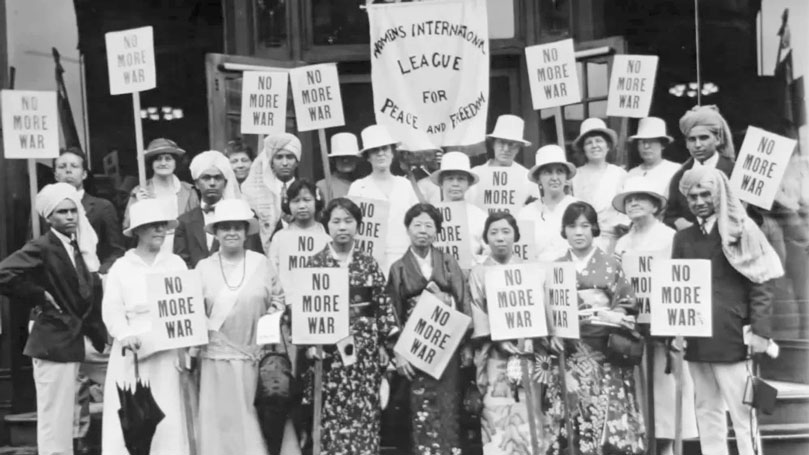
Women have always been at the forefront of working for peace and understanding between the peoples of the U.S. and China, from the YWCA in the 1920s to CODEPINK today. People-to-people friendship work can be an important force preventing war, especially when the relations between governments are tense. Women have done different things such as reporting and writing, material aid, protests, educational events, lobbying Congress and promoting international exchanges. All of these activities helped build long term relationships which, ironically, are often better remembered in China than the U.S.
The YWCA was active in China during the 1920s. While clearly having a missionary mission serving Western imperialist interests, the YWCA also provided much needed relief work in the country torn by war and poverty. The YWCA established schools, literacy programs and vocational training; it conducted public health campaigns on hygiene, nutrition, and disease prevention. The Y supported women’s rights and opposed foot-binding and child marriage. Maude Russell was an organizational secretary from 1917-41 and returned to the U.S. to head the Committee for a Democratic Far Eastern Policy and publish the Far Eastern Reporter. Talitha Gerlach went to China in 1926 sponsored by the YWCA international department and returned to the U.S. to head the China Welfare Appeal. Such efforts may be forgotten in the U.S. but are remembered and respected in China.
Women journalists have a long history of providing information for understanding of China. Agnes Smedley, daughter of a washerwoman in a poor miner’s family, travelled to China during the revolutionary war as a reporter. She was one of the first Westerners to write about the momentous struggles and changes. Her biography of the famous Chinese military commander Zhu De, entitled The Great Road, was based on extensive personal interviews around 1940. In China today, this book is considered a classic in Chinese revolutionary history.
Helen Foster Snow came to China in the 1930s and married Edgar Snow. She was a cofounder of China’s Gung Ho (working together) industrial cooperative movement. Her book My China Years and other writings are a primary source for the history of the revolution during the Yanan period. At her death in 1997, Helen Foster Snow was memorialized in Beijing’s Great Hall of the People, and today there are schools and hospitals named after her in China.
Anna Louise Strong wrote China’s Millions, which included descriptions of the lesser known democratic revolution in Wuhan in 1927; she later interviewed Mao when he said, “all imperialists are paper tigers.” Ida Pruitt was born in China to American missionary parents and helped establish the Chinese Industrial Cooperatives. She wrote the book Daughter of Han: The Autobiography of a Working Chinese Woman which describes the daily lives and challenges of Chinese women during the period of great changes. All of these women made great contributions to U.S.–China understanding and international people-to-people friendship.
The Women’s International League for Peace and Freedom actively opposed war and made contributions to peace in East Asia during the Vietnam war period. Unita Blackwell was born into an African American sharecropper’s family in Mississippi; she became a civil rights activist and mayor of Mayersville, Mississippi. Blackwell traveled to China as part of a women’s group in 1973. Upon return, she educated others about the People’s Republic and became president of the U.S.–China Peoples Friendship Association. Tall and wearing gold earrings, Blackwell was a striking figure and regarded by some Tibetans as a “living Buddha.”
Today, CODEPINK: Women for Peace, carries forth this tradition. It launched the China Is Not Our Enemy Campaign in 2020 to counter anti-China propaganda in the media and bring attention to the rising danger of U.S. imperialist war on China and build peaceful relations. The webpage features recordings of numerous excellent webinars and educational materials. CODEPINK has lobbied Congress and engaged in direct action. In Nov. 2024, CODEPINK sponsored a community delegation to China; seeing a socialist society with their own eyes was revelatory for many tour members. CODEPINK works to oppose Asian hate and deportation of immigrants as well as promoting peace and global cooperation on issues such as climate change. Their work is the latest example of the century-old practice of women leaders building friendship and understanding with the people of China.
The opinions of the author do not necessarily reflect the positions of the CPUSA.
Images: People protest war (Women’s International League for Peace and Freedom)


 Join Now
Join Now